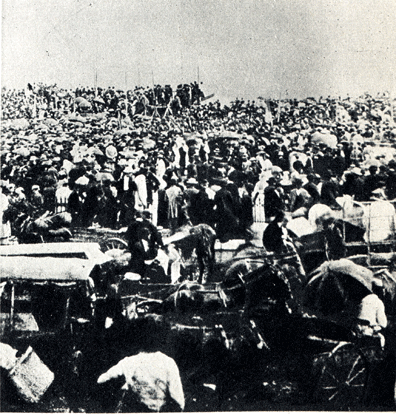Memory: the next frontier
- by Bruce E. McKinney

The crowd at Gettysburg: their thoughts?
Consider issues you have faced and are facing in your life and whether a clearer family history might help shape your responses. If your family had left a detailed record how might it shape your decisions? Whether the issue is learning disabilities, cancer or alcoholism, if you knew such issues occasionally appeared it might help shape your decisions. If breast cancer runs down both sides of the family tree it would encourage earlier testing. If Aunt Millie had a fondness for gambling this information might prove useful in the treatment of this problem should it reappear a generation or two later. Knowing family history helps us. In a similar way, knowing the family history of the family of man can help us avoid all kinds of social problems, conflicts and mistakes before they arise. Creating a record that future generations access will significantly improve their lives. This helps us. This helps them.
However, to remember and be remembered, we need to leave a record. For others to learn from us we need to tell them about us. In the past we left a stone marker, our name and dates. We lacked the capacity to leave more. In the future we'll leave our stories online, be visited from anywhere and found at any time. A hundred years from now others will have your story and those of others upon which to better understand themselves even as they remember us.
How might this work? It works by creating records that become searchable as part of an immense database, potentially inclusive enough to embrace all mankind. Search engines will uncover patterns within problems that in time help many avoid and others effectively deal with them. Individual experiences will help others facing similar challenges. The wealth of knowledge and experience we gain over the course of our lives will be passed on from generation to generation, rather than being lost forever when we die.
What will your role be? Simply put, it is to preserve as much of your knowledge and experiences as you wish. It may be personal or family history, your relationship to community, work, hobbies, or institutions. You may have witnessed events, historic or otherwise, on which you can provide a unique perspective. You may have conducted research in some field, written a musical score or poem, or even witnessed some dark event you might wish to forget, but humanity must remember. Almost certainly, you have a collection of photographs, themselves a witness to history that will be lost if you do not identify and preserve them. The most important thing you can do for future generations is to see to it that all of this knowledge you alone possess is not lost. You may not realize it now, but your knowledge is vitally important, though it may take future generations to fully appreciate the value of all you have learned.
What remains to be done? First there is the database, a place to save your memories, and then the software so others can retrieve them. It will need to be searchable in many ways, by names, dates, events, maps, and so on. We are working on this, but suspect others will soon want to join in this next great project that preserves memory. Then your part will come as you fill in the blanks, tell your story, write your poems and share your photographs. Here we add a personal note. This project will be most appreciated by future generations, but for ourselves, it offers something those stone markers we now leave behind never have. It preserves who we are as human beings. It enables us to live on in the thoughts of others long after our lives on earth are over. It makes us immortal. It will happen.